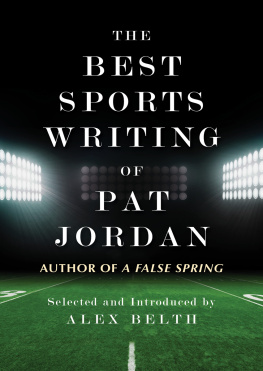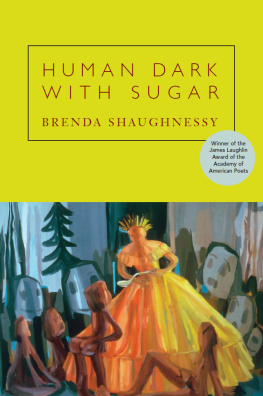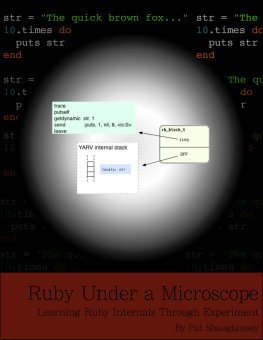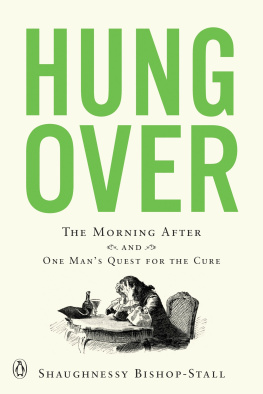A Mariner Book
Houghton Mifflin Company
BOSTON NEW YORK
Books by Dan Shaughnessy
Courtside
(with Gary Hoenig)
One Strike Away
The Curse of the Bambino
Ever Green:
The Boston Celtics
Seeing Red:
The Red Auerbach Story
At Fenway
Fenway
(with Stan Grossfeld)
Spring Training
(with Stan Grossfeld)
The Legend of the
Curse of the Bambino
Reversing the Curse
Senior Year
First Mariner Books edition 2008
Copyright 2007 by Dan Shaughnessy
All rights reserved
For information about permission to reproduce
selections from this book, write to Permissions,
Houghton Mifflin Company, 215 Park Avenue South,
New York, New York 10003.
www.houghtonmifflinbooks.com
Library of Congress Cataloging-in-Publication Data
Shaughnessy, Dan.
Senior year : a father, a son, and high school baseball
/ Dan Shaughnessy.
p. cm.
ISBN-13: 978-0-618-72905-0
ISBN-10: 0-618-72905-4
1. BaseballMiscellanea. 2. Shaughnessy, Dan.
3. Fathers and sons. I. Title.
GV 867.3. S 53 2007
796.357'62dc22 2006030477
ISBN 978-0-547-05382-0 (pbk.)
Book design by Melissa Lotfy
Printed in the United States of America
VB 10 9 8 7 6 5 4 3 2 1
To:
JOHN P. FAHEY
ANDRE VAN HOOGEN
JOHN COLANTONIO
JOE KING
MANNY CONNERNEY
JOE SICILIANO
And all those who coach and
teach our children...
Contents
Introduction 1
Groton to Newton 7
Sam 25
September 51
October 63
November 83
December 103
January 119
February 131
March 147
April 163
May 183
June 199
Acknowledgments 227
Introduction
It was getting dark and I was standing in the parking lot beyond the right field fence at the high school baseball field. The kids call it "third lot." It once provided parking for Newton North High School students, but that was before too many kids got cars, so now it's reserved for faculty and seniors during school hours. At this moment, third lot was two-thirds empty and the only remaining cars belonged to the players on the baseball team, plus a handful of parents and friends.
I had my keys in my hand. I'd already said goodbye to my old high school coach, who'd made the drive down from New Hampshire to sit with me and watch my son play. It was a cold New England May day and the game was running long and I had to get going. I was due at a wake for the 21-year-old son of my cousin. The wake was taking place in the small town where I was born, an hour's drive to the west, and the notice in the newspaper said visiting hours would be over at 7 P.M.
It had been an emotional day, sitting on the cold metal slats, watching Sam hit, catching up with my old coach, and thinking about what my cousin Mickey was going through. I hadn't seen Mickey in over a year. We were never especially close. That happens when you have fifty-one first cousins and move away after college. But it was easy to remember everything I admired about Mickey. He was a terrific high school athlete, only two years older than me. He seemed to be better than everyone else at everything: Football. Basketball. Skiing. He was strong, tough, skilled, and movie-star handsome. He had his own rock 'n' roll band. Chicks dug him and guys wanted to be him. It would have been easy to hate the guy, but he was generous and caring, and when I would see him years later he was always humble about his high school greatness. He'd made a fine life for himself, working for the gas company and raising two kids with his wife. Now he was getting ready to bury his son, young Michael, who had died at home in bed, another victim of the national scourge of Oxy-contin. Michael had been a high school football stud, just like his father. He had been good enough to win a scholarship to Wagner College, and there had been a picture in the local newspaper of Michael signing his letter of intent. Now, just a couple of years later, his picture was in the paper again, accompanied by one of those impossibly sad stories about a promising young life that ended too soon.
So I was feeling a little guilty as I stood in third lot, jangling my keys and watching the high school baseball game groan into extra innings. I didn't want to miss the wake, but I remembered that earlier in the day Mickey's brother had told me, "We'll be there long after seven." Besides, Sam was scheduled to lead off the bottom of the tenth and he was due. He had been hitting the ball hard all day, but he was sitting on an 0-4 and I knew his small world would tumble into chaos and panic if he went hit-less for the day. Such is the fragility and self-absorption of the high school mind.
I was wondering about my own mind, too. I am a professional sportswriter, specializing in baseball. I've been a columnist for the Boston Globe for more than fifteen years, covering Olympics, Super Bowls, World Series, Stanley Cup Finals, NBA Championships, and Ryder Cups. I traveled with the Baltimore Orioles, Boston Celtics, and Red Sox back in the days when writers really traveled and lived with the ballplayers. I've written ten books, seven on baseball. I can go to any game, any time I want. And yet I find myself fixated on the successes and failures of Newton North High School and Sam Shaughnessy, my only son and the youngest of three ballplaying children. Sam's sisters had fun and fulfilling seasons in high school volleyball, field hockey, and softball, and I was amazed at how following their games connected me to their school and our community while kindling so many thoughts of my own high school days thirty years earlier. Probably that's why I found myself suddenly skipping Red Sox road trips and canceling TV appearances because of weather-forced changes in the high school baseball season. Random Sox fans wanted to ask me about Curt Schilling and Jonathan Papelbon. I'd rather talk about Newton North lefthander, J. T. Ross.
The score was still tied when Sam walked to the plate to open up the bottom of the tenth, and we were definitely losing the light, making it even tougher to hit. The Braintree coach came out to talk to his pitcher. I looked at the sky. I looked at my watch. This was it. I'd stare through the chain link for one more at bat, then get in the car. Darkness was going to make this the last inning, even if the score was still tied after ten.
And then, in an instant, the baseball was screeching over the first baseman's head, over the rightfielder's head, over the chain link, and onto the trunk of the 1998 Toyota Corolla that Sam had driven to school that day. It rolled across the lot and came to rest under a tree. I retrieved the ball while he circled the bases.
There was no such thing as a "walkoff" home run when I went to high school. We had read the stories about Bobby Thomson's Shot Heard Round the World, and all my friends and I knew that the Pirates' second baseman Bill Mazeroski had won the 1960 World Series with a homer in the bottom of the ninth ... but nobody talked about "walkoffs" until Kirk Gibson dropped one on Dennis Eckersley in the 1988 World Series. Eck popularized the term, and now there are walkoff homers, walkoff doubles, walkoff walks, even an occasional walkoff balk.
In any event, Sam Shaughnessy had his first high school walk-off homer (a drive-off walkoff, given the dent in the Toyota) and knew enough to take his helmet off after rounding third base. He had seen Red Sox slugger David Ortiz do this a lot. A helmetless head is less likely to be pounded by your teammates.
I walked in from right field and delivered the baseball to my smiling son. I told him not to worry about the dent on the roof of the trunk (not sure my dad would have been so casual about the damage done). Then I got in my car and drove to the wake.
Next page








